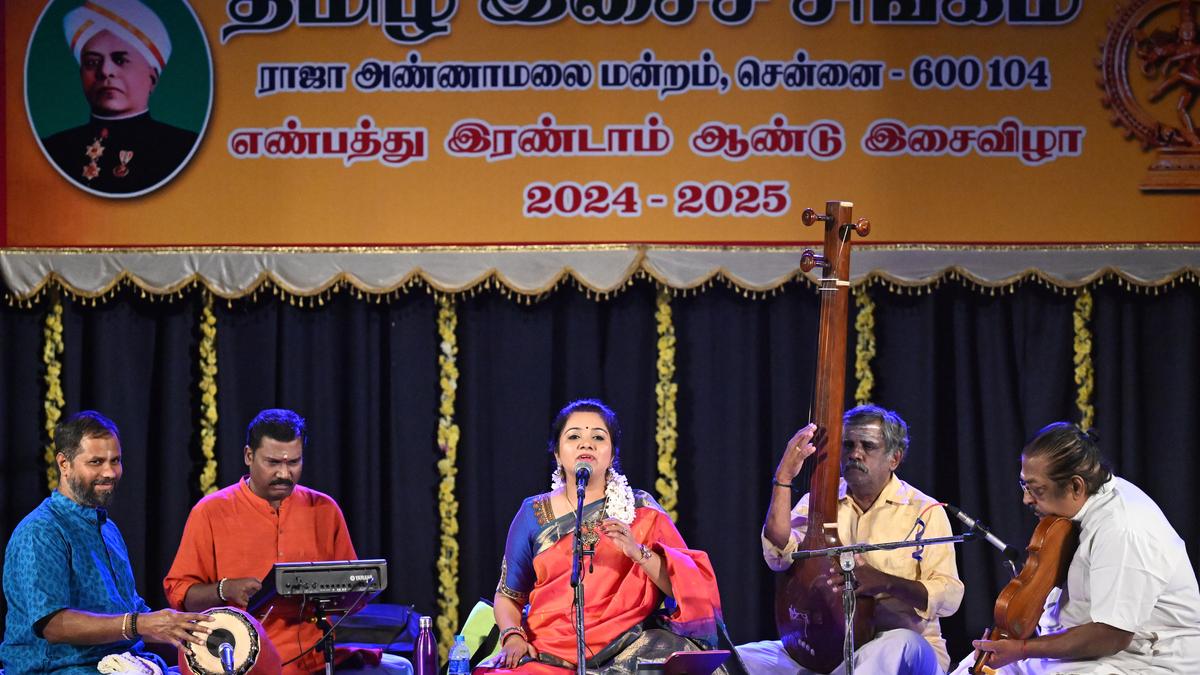
Mahathi’s ode to Tamil language and culture
The Hindu
S. Mahathi's Tamil Isai Sangam performance showcased traditional Tamil music with skilled accompanists and a diverse songlist.
S. Mahathi’s performance at the Tamil Isai Sangam was rooted in reverence for Tamil musical traditions. She was accompanied by V.L. Kumar on the violin, Vijay Ganesh on the mridangam and K.R. Venkatasubramaniam on the rhythm pad.
Mahathi had curated a songlist of compositions by Tamil composers and saints — she began with an elegant rendition of ‘Vallabhai nayaka’, a varnam in Mohana Kalyani, composed by Lalgudi Jayaraman. This piece, filled with devotion and grace, set the tone for the concert. This was followed by Rukmini Ramani’s ‘Selva ganapathiye sharanammayya’, set in Valaji and Adi tala. Valaji, a pentatonic raga (audava raga) devoid of Ma and Ni, has a bright, uplifting quality. Mahathi’s kalpanaswaras, starting from ‘Aadiduvai endru’, explored Valaji’s crisp melodic contours. The mridangam’s rhythmic support and the rhythm pad’s understated ghatam tones added depth.
The concert’s progression brought a distinct shift with Ramalinga Adigalar’s Tiruvarutpa, with the Virutham ‘Orumayin’, followed by the poignant ‘Appa naan vendudhal ketarul’. While the emotional depth of the raga was palpable, there was a subtle, recurring moment where Mahathi referred to the lyrics, ensuring the precision of her delivery.
In Arunachala Kavirayar’s ‘Kanden kanden kanden Seethaiyai’ in Vasantha and Adi tala, Mahathi painted a vivid musical picture of Sita’s darshan. The short alapana preceding the kriti was marked by elegant sangatis, with the violinist’s responses adding a reflective touch. In the kalpanaswara, there was a brief moment of pitch adjustment in the first round, but Mahathi regained her alignment, maintaining the flow of the performance.
Following this was the popular Nattakurinji composition ‘Vazhi maraithirukudhu’ by Gopalakrishna Bharati, known for its wistful beauty. The anupallavi, though interrupted briefly, due to slight vocal strain during the high-pitched phrases, regained its footing, particularly in the charanam.
The concert’s tempo shifted with ‘Sutrunai Vediyan’, a Thevaram in Kedaragowla, and ‘Saravana bhavaguhane’ in Kannada, both fast-paced compositions.
The main piece, ‘Yadhumagi nindrai kaali’, was a majestic exploration of Varali, one of the five Ghana ragas. Mahathi’s alapana unveiled the raga’s beauty through intricate gamakas, while the violinist mirrored her exploration with an equally eloquent response. Bharatiar’s virutham, ‘Ninnai sila varangal ketpen’, set the stage for the kriti, which was rendered with an intensity that captured the divine ferocity of Kali. The robust support of the percussion instruments, elevated the performance.





















 Run 3 Space | Play Space Running Game
Run 3 Space | Play Space Running Game Traffic Jam 3D | Online Racing Game
Traffic Jam 3D | Online Racing Game Duck Hunt | Play Old Classic Game
Duck Hunt | Play Old Classic Game











